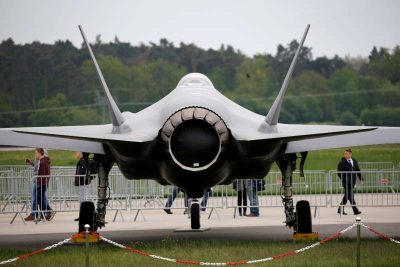Germany to buy US-made F-35s capable of carrying nuclear weapons
Germany will replace some of its ageing Tornado bomber jets with United States-made F-35A Lightning II aircraft capable of carrying nuclear weapons, according to the country’s defence minister.
Defence minister Christine Lambrecht said on Monday that Germany will also upgrade its Eurofighter Typhoon fighter jets for electronic warfare – a capability that is also currently fulfilled by the Tornado jets.
The Eurofighter will be replaced beginning in 2040 with the Future Combat Air System, or FCAS, that’s being jointly developed with France and Spain, she said.
Germany’s air force (Luftwaffe) commander, Ingo Gerhartz, said the Russian war in Ukraine made it necessary to choose Lockheed Martin’s F-35s.
Previously, the government had considered replacing the Luftwaffe’s Tornados with a mix of different US and European-made aircraft.
“There can be only one answer to [Russian President Vladimir] Putin’s aggression,” said Gerhartz. “Unity in NATO and a credible deterrent. This in particular means there is no alternative but to choose the F-35.”
The German military does not have nuclear weapons of its own, but as part of the system of nuclear deterrence developed during the Cold War, it maintained bombers capable of carrying US atomic bombs, some of which are stationed in Germany.
The opposition Left Party criticised the decision to buy almost three dozen F-35s for Germany’s military.
“We reject arming the Bundeswehr [German army] with new, nuclear-capable combat jets,” said Ali al-Dailami, the party’s deputy defence spokesman.
He warned that equipping German pilots to drop US atomic bombs could “fuel the risk of nuclear war in Europe”.
US ambassador to Germany Amy Gutmann welcomed the announcement, however, saying that by acquiring new nuclear-capable aircraft Germany was “cementing its continued participation in NATO’s nuclear-sharing mission”.
“Such a strong sign of Germany’s commitment to NATO’s deterrence could not come at a better time,” she said.
German Chancellor Olaf Scholz announced last month that the country would create a special fund of 100 billion euros ($113bn) to bolster its armed forces and raise defence spending above two percent of gross domestic product (GDP), a measure on which it had long lagged behind other NATO countries.


